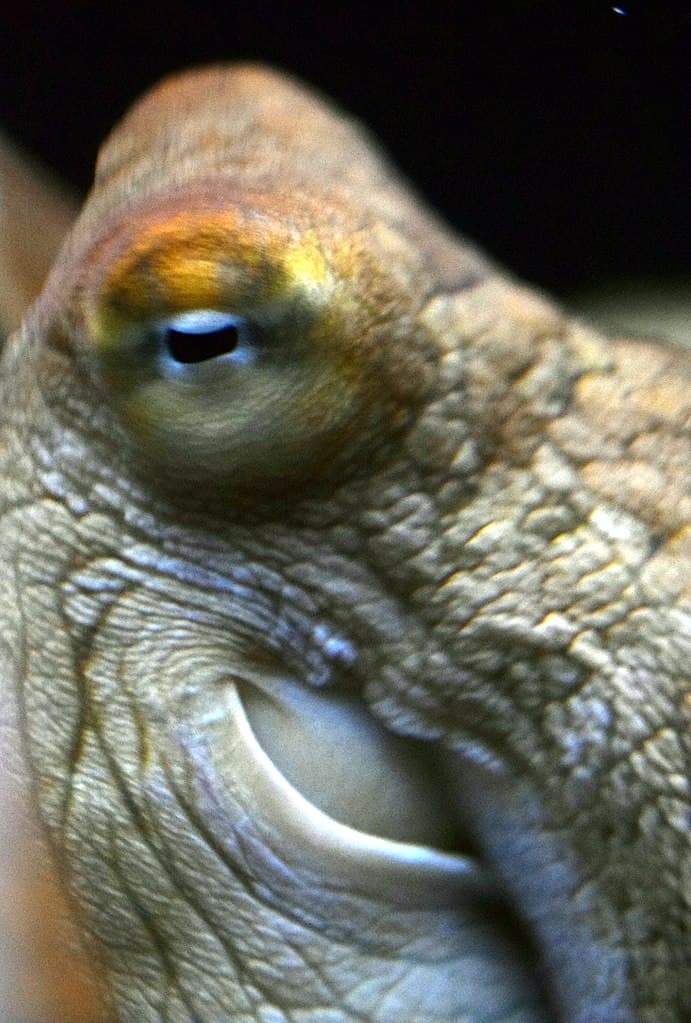


When they would shine the light on a piece of fish, the octopus would initially avoid the food before seemingly deciding to override its instincts and grab the fish anyway. One of Shomrat and Neshir's experiments confirmed this, too. However, octopus eyes focus like a camera with the. Put together, the studies suggest that the arm is sensing the light, sending a message to the brain through nerves in the muscle, and the brain is telling the octopus to move the arm. Each has a cornea, an iris, an accommodating lens, a fluid-filled vitreous humor, a retina, and so forth. When the scientists cut the muscles at the base of the arms, that also eliminated the arm retraction. However, while the chromatophores in the sleeping octopus reflexively reacted to the light, the arms didn't pull away. If light avoidance were entirely based on a local reflex, it might occur in an unconscious octopus. So the light sense cells in the retina point into the inner space of the eyeball, towards the incident light. The retina develops as a part of the eyeball and thus is innerved only later. Mollusc eyes, however, evolved in another way than vertebrate eyes. Vision is incredibly important to octopuses as it. An octopus has got lens eyes, generally equal to a vertebrates eye, at its disposal. Next, they illuminated the arms of several anesthetized octopuses. Octopuses have two eyes that are located on each side of their head, similar to the positioning of human eyes. They found that the tip of the arm was the most sensitive to it. This is now known to be Rex Housing, a small for-profit, originally set up by Suffolk-based developer Oldman Homes, that currently owns 12 homes. First, they illuminated different parts of the octopus's arm to determine the region most sensitive to light. Octopus Real Estate, which has more than £3.5bn of assets under management in adjacent sectors, announced in May that it had acquired a registered provider (RP). To answer this question, they performed a few additional experiments. Is it a simple reflex controlled completely by neurons - or special nerve cells -in the arm, or is it controlled by the brain? Having established that octopus arms can sense and react to light, their next step was to explore what controls this reaction. to evolution is when we examine the eyes of cephalopods, like the octopus. "In our experiments, we checked for changes in temperature and there weren't any. A vertebrate eye, such as that possessed by humans, contains a number of. "We often feel the heat from intense light, but for the octopus, this isn't the case," Neshir said. While the octopus was blindly feeling around for a piece of food, the researchers would shine a bright light on the octopus's arm at a random time about 84% of the time when they shone the light, the octopus would rapidly pull its arm away, suggesting that the octopus is able to sense and react to light with its arms, even when they can't see the light with their eyes. The octopus, kept in the dark, was trained to reach an arm through a small hole in the top of the tank to find pieces of fish. Their new experiment involved placing an octopus in a tank covered in an opaque black tarp. "We shifted our experiment to explore this behavior after we found out that nobody had described it before."

#Octopus eyes skin
Now, two new studies have found evidence of rhodopsin a light-sensitive protein usually in retinasin the skin of cephalopods. It was very surprising," Shomrat told LiveScience. Cephalopods such as squid, octopus, and cuttlefish use these chromatophores to dramatically change the color, shape, and texture of their skin, and scientists began to wonder if they could sense light as well. The extent to which the ability contributes to their swift changes in appearance, however, remains unknown."We were using a very strong flashlight and when we illuminated the tip of the arm, it would always pull away. These findings, reported online today in The Journal of Experimental Biology, suggest that the light-sensing ability may have originated with an ancestral mollusk, which over time cephalopods have drafted to facilitate their unique behavior. Although most other mollusks, including scallops and snails, lack the cephalopods' skill in shapeshifting, they can sense light with their skin, too. Now, two new studies have found evidence of rhodopsin-a light-sensitive protein usually in retinas-in the skin of cephalopods. Cephalopods such as squid, octopus, and cuttlefish use these chromatophores to dramatically change the color, shape, and texture of their skin, and scientists began to wonder if they could sense light as well. When researchers shone a bright light on it and then removed the light, chromatophores-tiny, circular pigment-filled structures-embedded in the skin would expand and then relax. Several decades ago, scientists noticed that octopus skin did something strange.


 0 kommentar(er)
0 kommentar(er)
